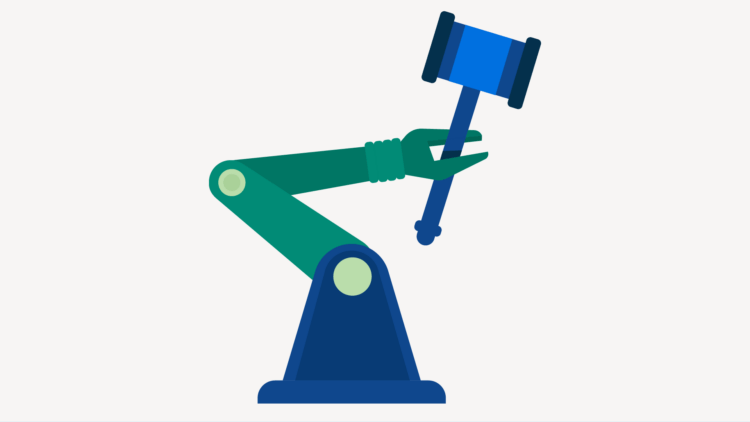As AI evolves, its impact is being felt in virtually every industry, including the legal industry. Lawyers and law firms are increasingly finding innovative ways to use technology to help clients. While legal innovation is exciting, there are important considerations to keep in mind.
In this article, we dig into legal innovation, including the challenges and benefits of AI. We’ll also explore some key trends, best practices, and ethical considerations you’ll need to keep in mind as you embrace innovation in the legal sector.
Ready to enhance your legal practice with AI? Clio Duo is our secure, AI-powered solution that helps boost productivity and efficiency, transforming the way legal professionals work–check it out here.
Understanding legal innovation
Legal innovation is the ongoing process of finding new, creative ways to effectively and efficiently deliver legal services. The idea is to apply concepts, processes, and technologies that improve the legal experience for clients and the process of providing services for law firms.
While much discussion of legal innovation focuses on technology, such as AI, machine learning, and the cloud, innovation also encompasses mindsets that encourage openness to ideas, collaboration, and addressing client needs.
What are the four types of innovation?
Legal innovation isn’t limited to creating new products—it also involves adopting new practices to boost productivity and efficiency in your firm. Here are the four types of innovation across the legal industry:
- Incremental Innovation: Small improvements to existing legal tools, like updates to case management software that enhance user experience and reduce the administrative workload.
- Disruptive Innovation: Introducing a new product or service that creates or reshapes a market, often starting with simpler, cheaper solutions aimed at underserved areas before overtaking established competitors.
- Architectural Innovation: Reconfiguring existing legal services for new markets, like virtual law firms using cloud-based software and video calls to offer remote consultations and document reviews.
- Radical Innovation: Groundbreaking changes in the legal industry, such as the development of AI tools that can summarize legal documents, find openings in your calendar, send bills, write messages to clients, and more–like Clio Duo.
Legal innovation in law firms often involves breaking from tradition by incorporating new technologies, such as cloud-based case management, legal-specific accounting software, and AI tools.
These advancements reflect both incremental innovation, like software updates that boost efficiency, and architectural innovation, where services are adapted for modern needs, such as remote consultations. By embracing these tools, your firm can streamline operations and enhance client service, helping you stay competitive in the evolving legal industry.

Benefits and challenges of legal innovation
A key point about legal innovation is that it provides benefits for both clients and law firms. Law firms benefit by standing out from the competition when their clients receive a seamless legal experience. This leads to loyal clients and increased referrals.
Additional benefits of adopting legal innovation such as AI:
- Enhanced productivity: AI can automate repetitive tasks that take time away from more strategic or billable work, freeing you up to focus more on your clients.
- Enhanced client service: AI tools can provide clients with more streamlined services, greater access to legal resources, and a more robust process, decreasing their stress.
- Improved work-life balance: AI tools can help lawyers automate administrative tasks, review large documents, and craft professional messages to clients, giving them more time back in their day.
Challenges associated with legal innovation:
- Job displacement: There are concerns in the legal industry that AI tools and automation could lead to job losses. While some firms might look to reduce headcount, the truth is that these tools cannot replace the critical human element vital to legal work. Instead, they enhance efficiency and productivity, allowing lawyers to increase profits, help more clients, and get more time back.
- Client confidentiality: Law firms must ensure the tools they use have thorough security measures and are compliant with regulations– many states are trending to regulate the use of AI.
- Tip: Tools like Clio Duo are built inside of our case management solution, using the industry-leading security that lawyers have come to enjoy with Clio Manage.
- Cost of implementation: AI tools may come with a high initial cost, making some expensive for solo and small law firms. If your firm is investing in AI, legal-specific AI tools offer more bang for your buck instead of trying to securely use less expensive, open-source AI tools.
- Lack of transparency: If an AI tool, such as ChatGPT, is used to draw conclusions, there can be a lack of transparency into how that tool has arrived at its conclusions. This can be problematic in legal decision-making.
You may like these posts
Key technological advancements in legal innovation
Over the past couple of decades, the legal industry has embraced various technological advancements designed to improve access to legal services and increase efficiency. Two key examples of these legal innovations include:
AI for lawyers
Innovation in law firms is increasing by leveraging generative AI for contract review, document drafting, due diligence, legal analytics, and e-discovery to identify risks and predict outcomes like the likelihood of winning a case. Trained on large datasets, AI can spot patterns, predict disputes, and suggest optimal strategies or pricing models for legal services–making law processes faster and more efficient.
By handling repetitive and time-consuming tasks, generative AI allows lawyers to focus on complex, high-value work, improving overall productivity and decision-making.
AI tip: Avoid relying on large language models like ChatGPT for legal research. AI tools are not designed to replace your legal expertise, are prone to bias, and lack the security needed to handle sensitive case information or client details. It’s important to consult trusted legal databases and your own professional knowledge for accurate, confidential research.
Cloud-based legal software
Cloud computing allows law firms to store and access data remotely, giving them the freedom to work on the go. Cloud software offers flexibility, remote access, and cost-efficiency, with automatic updates and easy scalability. Here are several ways cloud-based case management software can enhance your law firm’s operations:
- Improves accessibility to documents, and fosters collaboration on client files.
- Enables clients to access information and have real-time insights into their cases.
- Allows for in-person card payments, online payments, and flexible payment plans for faster collection.
- Offers integration options for using different legal tech applications with your case management software, such as legal research tools, virtual receptionist services, and more.
- Constantly improving, with new features and features updates, continuously aiming to improve a lawyer’s productivity and boost a firm’s performance.
What is the impact of technology on law firms?
Technology has transformed law firms by automating routine tasks, improving efficiency, and enhancing client service. AI-driven tools handle tasks like contract review and legal research, while cloud-based platforms enable remote work and seamless collaboration. These innovations not only streamline operations but also reduce costs and improve decision-making through data-driven insights.

What’s driving legal innovation in law firms?
While the legal industry has historically been slower to embrace technology and innovation, in recent years there has been a dramatic increase of innovation in law firms. These have been driven by client expectations, increased competition, and regulatory changes.
1. Legal client expectations evolving
Today’s legal clients are becoming accustomed to the efficiency and transparency offered by cloud-based services and AI. While their experiences are often based in other sectors, clients now demand similar services and experiences from their lawyers. This includes faster turnaround times, more cost-effective solutions, timely response times, and easier access to legal services.
If clients are concerned about costs, they may expect their lawyer to take steps that maximize productivity, such as using AI and technology to provide quality service more quickly and efficiently.
2. Increasing competition in the legal market
Law firms face intense competition for clients. While this can provide clients with lower costs and increased access to services, it puts pressure on lawyers to lower their costs and work even longer hours.
With more legal tech companies and alternative legal service providers encouraging traditional firms to innovate and streamline their practices, law firms must find a way to keep up. If innovative law firms can provide a high level of service more quickly and cost-effectively, clients will be motivated to work with those firms.
3. Regulatory changes and compliance requirements
The legal industry tends to be traditional, holding onto established processes and procedures. Part of the reason for this is that they are subject to regulations from the government and their bar associations. Now that governments and bar associations are enacting regulations allowing–while still governing–the use of AI, law firms have a greater ability to innovate.
What is the most innovative legal practice area?
In 2023, data privacy, cybersecurity, technology and intellectual property law are among the most innovative legal practice areas, driven by digital transformation and regulatory complexity. Environmental and sustainability law is also growing due to increasing focus on climate change .
How to embrace legal innovation in law firms
If you’re looking to adopt legal technology such as AI or cloud-based solutions at your firm, there are some best practices to follow:
Prioritize security and data privacy first.
When evaluating legal tech solutions, focus first on robust security measures and data protection. Client confidentiality is critical, so ensure any AI tools, and cloud-based software you use is compliant with all relevant regulations. This is done by choosing legal-specific tools and doing your research to confirm the security of inputting data into these tools.
Start small and build up.
Rather than overhauling your firm’s entire system, start by piloting a single, well-researched solution that addresses a specific law firm pain point.
For example, if billing clients takes up too much administrative time, explore billing tools that automate your billing processes and allow for online payments. Once your firm is comfortable with that tool, you can begin to explore other tools, such as legal-specific accounting tools, e-filing tools, and AI tools for lawyers.
Invest in user training and support.
Your law firm’s tech stack and the AI tools you’ve adopted are only as effective as your staff. Ensure everyone who will use these tools is properly trained to do so. Each staff member who interacts with the tool should feel confident about and capable of integrating that tool into their tasks–or else, what’s the point?
Championing the adoption of AI at your law firm
Some law firms may not embrace legal innovation, such as AI, right away. It could be up to you to champion innovation. Overcoming barriers might be an uphill battle but it’s worth it, and there are ways to show your team, and the firm partners, the value of AI in meeting your growth, efficiency, and financial goals:
- Start by building a business case that highlights a specific pain point in your firm. This should be focused on a pain point that significantly affects your firm, such as inefficient non-billable tasks, high overhead costs, or client dissatisfaction. Research AI tools that can address those issues and quantify the potential return on investment. Highlight how the AI tool can save your firm time or money, or improve client satisfaction.
- Find allies who will support you. Talk to other lawyers and staff members in your firm who are interested in adopting AI tools and agree that there is a need to implement it. Form a group to advocate for changes, and explore potential solutions. As a group, you’ll likely have more success than as individuals trying to make a change.
- Focus on benefits. While features are nice, benefits mean more–Considering the ROI is vital when introducing new tools to your firm. When you share these AI tools with managing partners and firm staff, talk about how they will free up time for more strategic and billable work or enable you to improve the client experience.
Creating a culture of innovation in law firms
To foster a culture of legal innovation in law firms, it’s crucial to gain team buy-in and minimize the risks of change. Setting up a dedicated space—either physical or virtual—allows for testing new legal tools without compromising client confidentiality. Successful tools can then be rolled out firm-wide.
Cross-departmental collaboration also boosts innovation, as brainstorming across teams encourages support for new ideas–is there a tool the paralegals love? Or perhaps a tool the marketing team utilizes? Assigning a person or team to lead innovation efforts helps drive this process and ensures sustained progress.
What do legal innovators do?
Legal innovators enhance the legal industry by using technology and modern processes to streamline tasks like document management and case handling. They focus on improving efficiency, reducing costs, and offering more client-focused, accessible legal services through tools like AI, automation, and data analytics.
Ethical considerations in legal innovation and AI adoption
While AI provides many benefits for lawyers and clients, there are some ethical concerns around using it for work in the law.
Maintaining client confidentiality with AI
Client confidentiality is paramount in the legal industry. Your clients trust you with their personal and confidential information, which you have a professional and ethical duty to protect. When embracing legal innovation and introducing AI tools to your tech stack, you must have robust security measures to ensure sensitive client data and information is secure. This is especially crucial when using public AI tools such as ChatGPT.
Whether data is being stored or transferred, it should always be encrypted using industry-standard algorithms. Additionally, only authorized personnel should have access to that data.
Here’s some important information on keeping your data secure.
Machine learning and AI ethic implications
Lawsuits and legal decisions have life-altering consequences for clients. That’s why it’s crucial to ensure AI tools rely on and provide accurate information. Analyze the outputs and ask:
- “Does this make sense?”
- “Is this information accurate?”
- “What is this output based on?”
You must remain accountable for the work your AI tools produce. Ensure anyone who uses the AI tools is properly trained and can evaluate AI outputs.
Lawyers have an ethical duty to provide their clients with competent representation. While AI and machine learning can provide powerful information and make predictions, it should not replace a lawyer’s judgment.
Learn more about the ethics of using AI in our article AI and the Law: What are the Ethical Considerations?
Future outlook of legal innovation
As legal technology continues to advance, and law firms focus even more on client-centric services, AI will likely become more deeply integrated into law firms. For example, when used with complex legal analysis and strategy development, potentially providing more personalized legal services for clients.
Technology like Clio Duo is designed to serve as a partner to legal professionals, enabling you to gain smart insights, experience faster workflows, and complete everyday tasks with ease securely within Clio Manage. By taking a client-focused approach to legal innovation and balancing ethical and professional responsibilities, your firm can embrace new technology and take advantage of all the benefits it has to offer.
Book your free Clio demo and discover the powers of Clio Duo and what it can do to propel your firm forward.
What is the law of innovation?
The law of innovation refers to legal rules governing the protection and commercialization of new ideas, covering areas like intellectual property, antitrust, and contracts to protect innovators while promoting competition and advancement.
What are the best conferences for legal innovation?
Clio Cloud Conference (ClioCon): Focuses on how tech like cloud-based case management software, AI for lawyers, and other legal-specific innovations are transforming legal practices.
Legal Geek Conference: A London-based event covering legal startups, AI, and the future of law.
ILTACON: A major event with sessions on AI, automation, and cybersecurity in legal operations.
ABA TECHSHOW: Highlights practical legal tech tools to improve efficiency and client service.
We published this blog post in March 2024. Last updated: .
Posted in: Technology
The 2025 Legal Trends Report for Mid-Sized Law Firms report is here!
Mid-sized law firms are embracing AI and flat fees, improving revenue with Clio—but many still lag in cloud-based LPM. See the full industry insights in the 2025 Legal Trends Report for Mid-Sized Law Firms report.
Read the report







